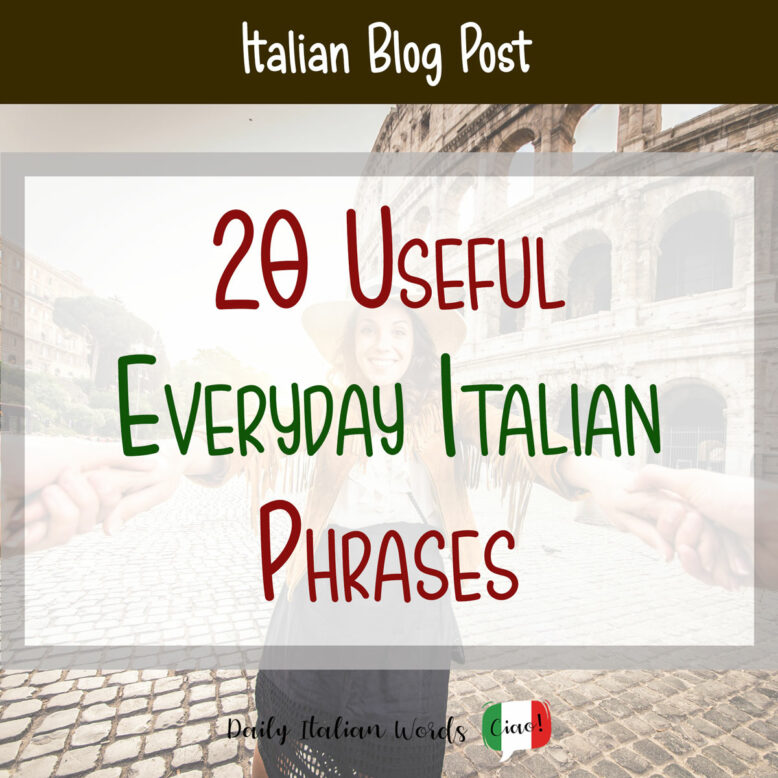You’ve been diving into Italian, and now it’s time to expand your vocabulary with some practical phrases for everyday life. Ready to enhance your Italian language skills? Let’s get started!

1. Mi dispiace disturbarti
English translation: I’m sorry to bother you
This expression serves as a polite way to initiate a conversation, especially with those you’re not acquainted with. It’s also suitable when you’re aware that the person you wish to talk to is occupied or engaged in another activity. In a more formal setting, you can replace “disturbar-ti” with the pronoun particle -la, saying, “Mi dispiace disturbar-la.” Another variation is Scusa se ti disturbo (Sorry if I’m bothering you).
2. Non vedo l’ora di vederti
English translation: I look forward to seeing you
This phrase can be used with your parents, relatives, close friends, or significant other. It expresses a strong desire to see someone again. It is often used when individuals live at a distance for a certain period or permanently, and there is anticipation of a forthcoming reunion. You can also say Non vedo l’ora di rivederti (I look forward to seeing you again).
3. È un peccato
English translation: It’s a pity / that’s a shame
The expression “What a pity” is an exclamation that you can use whenever something doesn’t go as expected. It can be in response to something that happened to yourself or someone you know, and in Italian, you might say: È un peccato or che peccato. For example, if your friend tells you that he didn’t pass his exam, you could respond with Oh no, che peccato!
4. Ne vale la pena
English translation: It’s worth it
This is an evergreen expression that can be used in various contexts. It means that something really holds value. Whether it’s for a new beginning, a project, a travel plan, or ideas, you can express your agreement with this phrase.
5. Ho la pelle d’oca
English translation: I’ve got goosebumps
There are two distinct ways to use this expression. The first is associated with the physical reaction when it is cold and your skin gets goosebumps. On the other hand, you can say mi è venuta la pelle d’oca when someone tells a story that scares you or sends shivers down your spine.
6. Sono d’accordo con te
English translation: I agree with you
This is a way of expressing agreement in a conversation, letting the other person know you believe they are right regarding a specific matter.
7. Di tanto in tanto
English translation: Every now and then
Di tanto in tanto has the same meaning as the English expression “every now and then.” It doesn’t imply randomness, as there is a subtle suggestion of periodic recurrence without specific dates. For example, Di tanto in tanto potremmo andare a pescare insieme means “Every now and then, we could go fishing together.”
8. Mi stai prendendo in giro
English translation: You’re kidding / teasing me
This phrase can be expressed with various tones, such as asking in a playful way, mi stai prendendo in giro? (Are you pulling my leg?) or with an annoyed tone. The interpretation often relies on the facial expression of the speaker, which holds significant importance in Italian communication.
9. Cento di questi giorni
English translation: Many happy returns
Italians use this expression in those moments when something is to be celebrated: a birthday, an anniversary, a marriage, a birth, or any other event that deserves to be remembered. It’s a wish for other people to have many more days like this one.
10. Tutto fa brodo!
English translation: Anything goes
This sentence is used quite a lot in Italy. Essentially, the expression conveys the idea that everything can be used in broth. As you may be aware, you can add various ingredients to a broth or choose not to. Using this as a starting point, Italians use the expression to convey that anything is suitable. Allow me to provide an example:
- Cosa posso portare stasera per la festa? (What can I take to the party tonight?) – Quello che vuoi, tutto fa brodo! (Whatever you like, anything goes!)
11. Senza se e senza ma!
English translation: No ifs, ands or buts!
“No ifs, ands or buts” is the English translation of the Italian expression “Senza se e senza ma.” It is typically used at the end of a statement to emphasise and make the preceding sentence unequivocal. This phrase is commonly used by parents when communicating with their children, as illustrated in this example:
Oggi non uscirai perché devi studiare per l’esame di domani, senza se e senza ma! (Today you won’t go out because you have to study for tomorrow’s exam, no ifs ands or buts!)
12. Non si può mai sapere
English translation: You never know
The expression “You never know” in Italian can be translated as “Non si può mai sapere” or “Non si sa mai.” This phrase serves as a reminder that life is unpredictable, and things may unfold differently than anticipated in one way or another.
13. A dirla tutta
English translation: To be honest
This is a preamble, an idiomatic expression used to initiate a response when you intend to express disagreement with the person you are conversing with. In English, a fitting equivalent might be “to be honest.” Let’s delve into an example for better clarity:
- A me è piaciuto molto il modo in cui hanno concluso il concerto, tu che ne pensi? (I really liked the way they ended the concert, what do you think?) – A dirla tutta, non mi è piaciuto per niente. (To be honest, I didn’t like it at all)
14. Chi c’è c’è, e chi non c’è si arrangia!
English translation: If you’re in, you’re in, if you’re not, deal with it!
This is an idiomatic expression frequently used in Italian, adaptable to various contexts. It can be employed whenever someone is running late, and those who are already present wish to proceed with the scheduled activity, be it an aperitivo, a party, a trip, or an outdoor dinner. In any situation, the phrase goes: “Chi c’è c’è, chi non c’è si arrangia,” essentially meaning “Those who are here are here, and those who aren’t will have to manage.“
15. Mi vengono i brividi al pensiero
English translation: I shudder at the thought
This sentence is quite similar to the previous one, Mi viene la pelle d’oca. However, in this case, it’s used when people discuss something that instills fear or makes you feel frightened. It’s suitable for situations where someone is narrating something that sends shivers down your spine or scares you to death. Another variation is Mi vengono i brividi solo a pensarci (I shudder just thinking about it).
16. Non tardare!
English translation: Don’t be late!
Though quite straightforward, this expression carries significance, particularly in regions of Italy where punctuality may not be a top priority. To convey “don’t be late,” you can use this phrase or simply say non fare tardi. To emphasise and ensure the message is clear, you might add mi raccomando.
17. Mi spiace, ma non ho capito!
English translation: I’m sorry, but I didn’t understand!
This sentence comes into play when someone is speaking rapidly and you’re having difficulty understanding, or when something is unclear for any reason. It is also used in a humorous context, especially when a joke is not easily understood: Mi spiace, ma non l’ho capita! (with l’ and the -a ending referring to the feminine noun la battuta, the joke).
18. Come si dice (…) in italiano?
English translation: How do you say (…) in Italian?
This is a useful sentence to have in your toolkit when you come across a word in Italian that you don’t know or have forgotten. Simply use this question to quickly acquire the missing word whenever needed.
19. Potresti prestarmi la tua penna per favore?
English translation: Could you lend me your pen, please?
In this instance, it’s a pen, but you can use this question to borrow anything from someone. It’s a polite and considerate way to request someone to lend you something, especially when you need it at that particular moment.
20. Quando è troppo è troppo!
English translation: Enough is enough!
Finally, there’s an expression that, when uttered, signifies that someone has reached their limit. It’s used when things have become overwhelming, and one feels on the verge of exploding. You might say, Basta adesso, quando è troppo è troppo! (Stop it now, enough is enough). Typically, it follows a series of repeated events with no desired outcome.
Conclusion
Now you’ve got a handful of sentences that will make you sound more Italian than ever. These phrases, when used in the appropriate contexts, can enhance your communication skills and boost your confidence in conversations. While there are countless sentences for everyday life in Italy, these provide a solid starting point. Give them a try and watch how the conversation unfolds—ne vale la pena! (It’s worth it!)


Fabio Guarino is a Linguist and Language Specialist who operates as a Freelance Content Writer and SEO Marketer. He considers himself fortunate to be able to blend his passion for his native language, Italian, along with English and Spanish, with his career.


